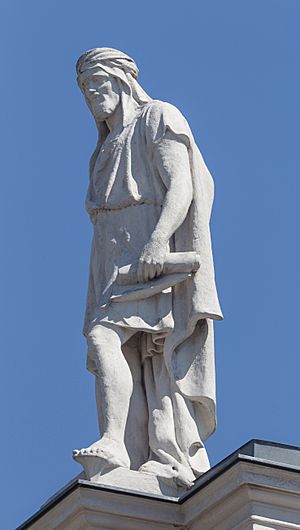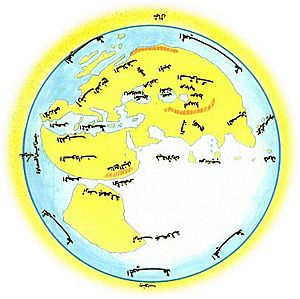- This page was last modified on 5 June 2025, at 08:52. Suggest an edit.
al-Masudi facts for kids
|
al-Masʿūdī
المسعودي |
|
|---|---|

Roof figure of al-Mas'udi, Naturhistorisches Museum, Vienna
|
|
| Born | 282–283 AH (896 AD) Baghdad, Iraq |
| Died | Jumada al-Thani, 345 AH (September, 956 AD) Cairo, Egypt |
| Era | Islamic golden age (Middle Abbasid era) |
|
Notable work
|
|
| Scientific career | |
| Influences | al-Shafi'i |
al-Masʿūdī (full name Abu al-Hasan Ali ibn al-Husayn ibn Ali al-Mas'udi), born around 896 AD and passing away in 956 AD, was an important Arab historian, geographer, and traveler. People sometimes call him the "Herodotus of the Arabs" because he was so good at writing history. He was a person with many skills, writing over twenty books on different topics. These included religion, history (both Islamic and world history), geography, natural science, and philosophy. His most famous book, The Meadows of Gold, mixed world history with scientific geography, social observations, and life stories.
Contents
A Life of Travel and Writing
Al-Mas'udi was born in Baghdad, which is in modern-day Iraq. He came from the family of Abdullah Ibn Mas'ud, a friend of the Prophet Muhammad. We don't know much about his early life, except what he wrote himself.
He traveled a lot during his life. He might have even reached faraway places like Sri Lanka and China. We know he met Abu Zaid al-Sirafi near the Persian Gulf. From him, al-Mas'udi learned a lot about China. He also met Leo of Tripoli, a Byzantine admiral who became a Muslim, in Syria. Al-Mas'udi spent his last years traveling between Syria and Egypt. In Egypt, he found a list of Frankish kings, from Clovis I to Louis IV of France. This list was written by a bishop from Andalusia.
It's not clear how al-Mas'udi paid for all his long journeys. Some people think he might have been involved in trade, like many other travelers of his time.
Al-Mas'udi wrote a new version of his book Muruj adh-dhahab in 956 AD. However, only an earlier draft from 947 AD still exists today. In another book, Tanbih, al-Mas'udi said that the updated Muruj adh-dhahab had 365 chapters.
A World of Knowledge
Al-Mas'udi lived during a time when books were easy to find and not too expensive. Big cities like Baghdad had large public libraries. Many people, like al-Mas'udi's friend as-Suli, had their own private libraries with thousands of books.
Paper-making came to the Islamic world from China after the battle of Talas. This happened early in the Abbasid era. Soon, most large towns had paper mills. Having cheap paper helped create a very active and smart society.
Al-Mas'udi often told his readers to look at his other books. This shows that he expected his books to be available to many people. The Islamic world at this time was very educated and lively. It had a rich mix of ideas from Greek philosophy, Persian literature, and Indian mathematics. This was very different from Europe at the same time. People in al-Mas'udi's world were curious and loved to learn. They enjoyed discussing ideas in a very civilized way.
Al-Mas'udi learned from many important thinkers. He knew famous poets and was well-read in philosophy. He studied the works of al-Kindi and al-Razi. He also knew about Aristotelian ideas from al-Farabi and Plato's writings. He probably met al-Razi and al-Farabi, but we only know for sure that he met al-Farabi's student, Yahya ibn Adi.
He was also familiar with medical books by Galen. He knew about the Ptolemaic astronomy (the idea that Earth is the center of the universe). He also studied the geographical works of Marinus and other Islamic geographers and astronomers.
Al-Mas'udi also learned about law. He met many important legal experts. Some scholars believe he was a student of Ibn Surayj, a leading expert in the Shafi'ite school of law.
He was interested in the history of ancient civilizations that lived in the lands where Islam later spread. He wrote about the Assyrians, Babylonians, Egyptians, and Persians. He is also the only Arab historian to mention the kingdom of Urartu.
Al-Mas'udi knew that ancient Babylon influenced Persia. He could read many translations from Middle Persian into Arabic. During his travels, he also talked to Persian scholars and Zoroastrian priests. This gave him access to many facts and myths.
He was also very interested in the Greeks and Romans. He knew that the Greeks' biggest contribution was philosophy. He understood how Greek philosophy developed over time. He also cared about the history of the Arabian peninsula before Islam. He knew it had a long and rich past.
Exploring Lands Beyond Islam
Al-Mas'udi was special because he was very interested in lands and people outside the Islamic world. Other writers, even Christians living in the Caliphate, wrote less about the Byzantine Empire than he did. He described the geography of many lands beyond the Abbasid Caliphate. He also wrote about the customs and religious beliefs of many different peoples.
He learned a lot from talking to travelers and reading books. But for India, he also used his own experiences from traveling in the western part of the country. He understood how history changes things over many generations. He saw how different states interacted and how Muslims and Hindus lived together in India.
He wrote about past rulers in China. He noted the importance of the revolt by Huang Chao in the late Tang Dynasty. He also briefly described Chinese beliefs. His short description of Southeast Asia is known for being very accurate. He also wrote about the large areas where Turkic peoples lived. He explained that there were many different Turkic groups, some living in cities and others as nomads. He also wrote about the important Khazars.
His writings about the Rus are a very important early source for Russian history and the history of Ukraine. Al-Mas'udi based much of his information on his own observations and contacts during his travels. He told Arab readers that the Rus were more than just a few traders. They were a diverse group of people. He noted their independent spirit and that they didn't have a strong central government. He also mentioned their pagan beliefs. He knew a lot about Rus trade with the Byzantines. He also knew that the Black Sea and the Caspian Sea are two separate bodies of water.
Al-Mas'udi was also very well informed about Byzantine affairs. He even knew about their internal politics and palace changes. He wrote about how tribes moving westward affected the Byzantines, especially the invading Bulgars. He also discussed Byzantine relations with western Europe. And, of course, he was very interested in how Byzantines and Muslims interacted.
One interesting example of al-Mas'udi's influence is how the name Istanbul (instead of Constantinople) can be traced back to his writings in 947 AD. This was centuries before the Ottomans started using the name. He wrote that the Greeks (meaning the Byzantines of his time) called their capital "the City" (polin in Greek). When they wanted to show it was the capital because of its size, they said "Istan Bulin." He noted that only Arabs called it Constantinople.
He also knew about other peoples in eastern and western Europe, even faraway Britain and Anglo-Saxon England. He knew Paris was the Frankish capital. He even got a list of Frankish rulers from Clovis I to his own time. He also mentioned people he called Majus, who came to Al-Andalus from the North. These were likely Vikings.
Al-Mas'udi's interest in the world included Africa. He knew a lot about people in the eastern part of the continent, like the Zanj. He knew less about West Africa, but he did name states like Zagawa, Kawkaw, and Ghana. He described how African states related to each other and to Islam. He also provided information on the cultures and beliefs of non-Islamic Africans.
Overall, his books show that he had a very curious mind. He wanted to learn as much as possible about the entire world. The wide range of places and topics he covered is truly impressive.
Al-Mas'udi and the Abbasid Caliphs
Al-Mas'udi's book Muruj al-dhahab includes many stories about the Abbasid caliphs. These stories often share funny and interesting details. For example, one story tells about the caliph al-Mansur meeting a blind poet. The poet didn't know who al-Mansur was and recited poems praising the defeated Umayyad caliphs. Al-Mansur, being good-natured, still rewarded him.
Another story is about an arrow that landed at al-Mansur's feet. It had verses written on it that led him to investigate a noble who was unfairly imprisoned. There's also a tale about the caliph Harun al-Rashid and a singer. Harun asked the singer to keep singing until he fell asleep. Then, a handsome young man appeared, took the lute, and showed the singer how it should really be played. When Harun woke up, he was told about this and thought it was a supernatural visit.
These stories give us a look into the lives of these important people. They show their human side and the concerns of their officials and ordinary people. One interesting part is about a discussion held at the home of Harun al-Rashid's vizier, Yahya the Barmakid. The topic was love, and many thinkers shared their definitions.
Works
- Kitab at-Tanbih wa-l-'Ishraf (كتاب التنبیه والأشراف), which means 'Book of Admonition and Revision'. This book is a shorter version of Muruj adh-Dhahab, about one-fifth its length. It includes new information about the Byzantines. Al-Mas'udi wrote it shortly before he passed away.
- Les Prairies d’or is the French translation of Kitāb Murūj al-Dhahab wa-Ma‘ādin al-Jawhar.
Religious Influences
Some early writers had different ideas about al-Mas'udi's religious views. The Sunni scholar Ibn Hajar thought al-Mas'udi's books were not precise because he might have been a Shi‘a or a Muʿtazili. Adh-Dhahabi believed he followed Mu'tazili ideas, which were seen as different from mainstream views.
However, according to Al-Subki, al-Mas'udi was a student of Ibn Surayj. Ibn Surayj was a leading scholar of the Shafi'ite school of law. Al-Subki even said he found al-Mas'udi's notes from Ibn Surayj's lectures. Al-Mas'udi also met Shafi'ites when he was in Egypt. He also met Zahirites in Baghdad and Aleppo. Modern scholars tend to think that al-Mas'udi followed the Zahiri school of thought.
See Also
 In Spanish: Al-Masudi para niños
In Spanish: Al-Masudi para niños
- List of pre-modern Arab scientists and scholars
- Yahya ibn Umar
- Abbasid Caliphate

